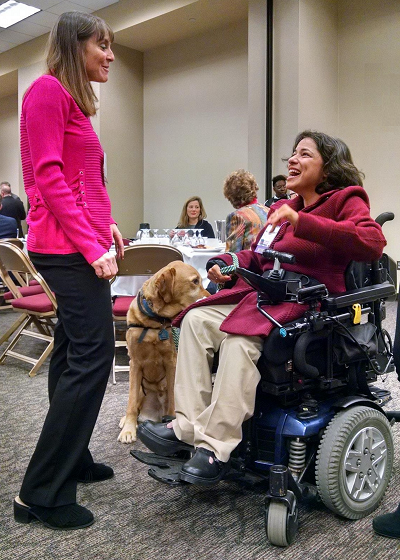
Much of our policy work in the Office of Disability Employment Policy focuses on state and local governments, where the rubber meets the road in terms of workforce solutions. Our unique position as the only non-regulatory federal agency focused on workplace success for people with disabilities gives us a broad lens, and we can share lessons learned in each region with the others.
This is the spirit behind our State Exchange on Employment & Disability (SEED), which helps state and local government policymakers adopt policies that encourage greater workforce participation of individuals with disabilities. To connect with these policymakers, we work with several intermediary organizations that collectively reach 50 governors, 1,400 mayors, 3,000 county governments and more than 7,000 legislators. Through this network, we can assist with policy options on a range of issues that directly and indirectly impact disability employment, from state hiring policies to helping youth transition to the workforce to accessible transportation and technology.
One example of a policy in action is “Employment First,” the philosophy that competitive integrated employment should be the primary expected outcome for people with disabilities, including those with the most significant disabilities. Employment First started at the state level, with a few states leading the way. In time, other states learned from their successes, and now, the competitive, integrated employment goal of the Employment First movement is national policy.
In 2014, the Workforce Innovation and Opportunity Act specifically stated that our nation’s workforce development system should “maximize opportunities for individuals with disabilities, including individuals with significant disabilities, for competitive integrated employment.’’ ODEP has supported states in promoting competitive integrated employment, known as CIE, through a variety of initiatives. Through our Employment First State Leadership Mentoring Program (EFSLMP) and our Visionary Opportunities to Inspire Competitive Integrated Employment (VOICE), ODEP has assisted 27 states and the District of Columbia to align their policy, funding and employment services in support of CIE for individuals with significant disabilities. Most recently, our Advancing State Policy Integration for Recovery and Employment (ASPIRE) initiative in seven states is helping advance CIE specifically for people with mental health conditions.
States also play a critical role in informing effective policy around ensuring workers with disabilities return to work and stay at work. Through our Retaining Employment and Talent After Injury/Illness Network (RETAIN) initiative, eight states are testing the efficacy of early intervention services for workers who become ill or injured and want to stay in or return to the workforce as soon as medically possible. Each RETAIN state takes a different approach, allowing us to identify models that could potentially be adapted elsewhere, taking into account various economic factors.
The value of such collective knowledge is enormous, especially as we work to rebuild our workforce in the wake of COVID-19. For this reason, last month SEED launched the COVID-19 Policy Collaborative for an Inclusive Recovery. Input from this collaborative — which comprises policymakers, subject matter experts and key stakeholders from cities and states — will help inform future policies for an equitable and inclusive economic recovery.
This year we celebrate our 20th anniversary, and we will continue to build on two decades of work reaching across state lines to advance disability-inclusive workforce policy. Ensuring all people in all states can build skills and put them to work is essential to our nation’s progress and prosperity at all times.
Michael Reardon is a supervisory policy advisor in the department’s Office of Disability Employment Policy.

 U.S. Department of Labor Blog
U.S. Department of Labor Blog